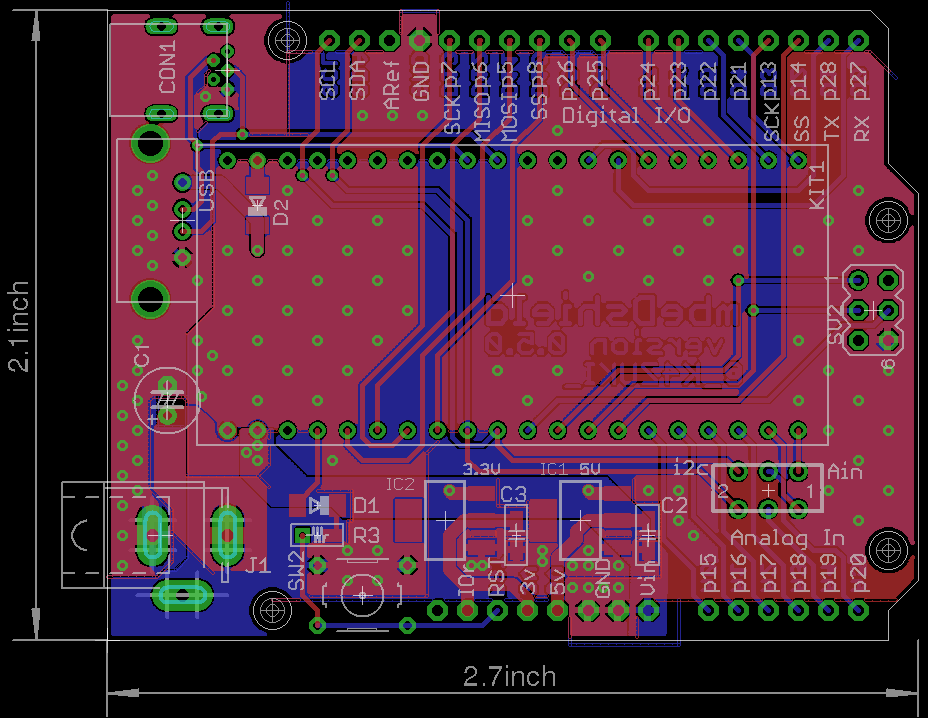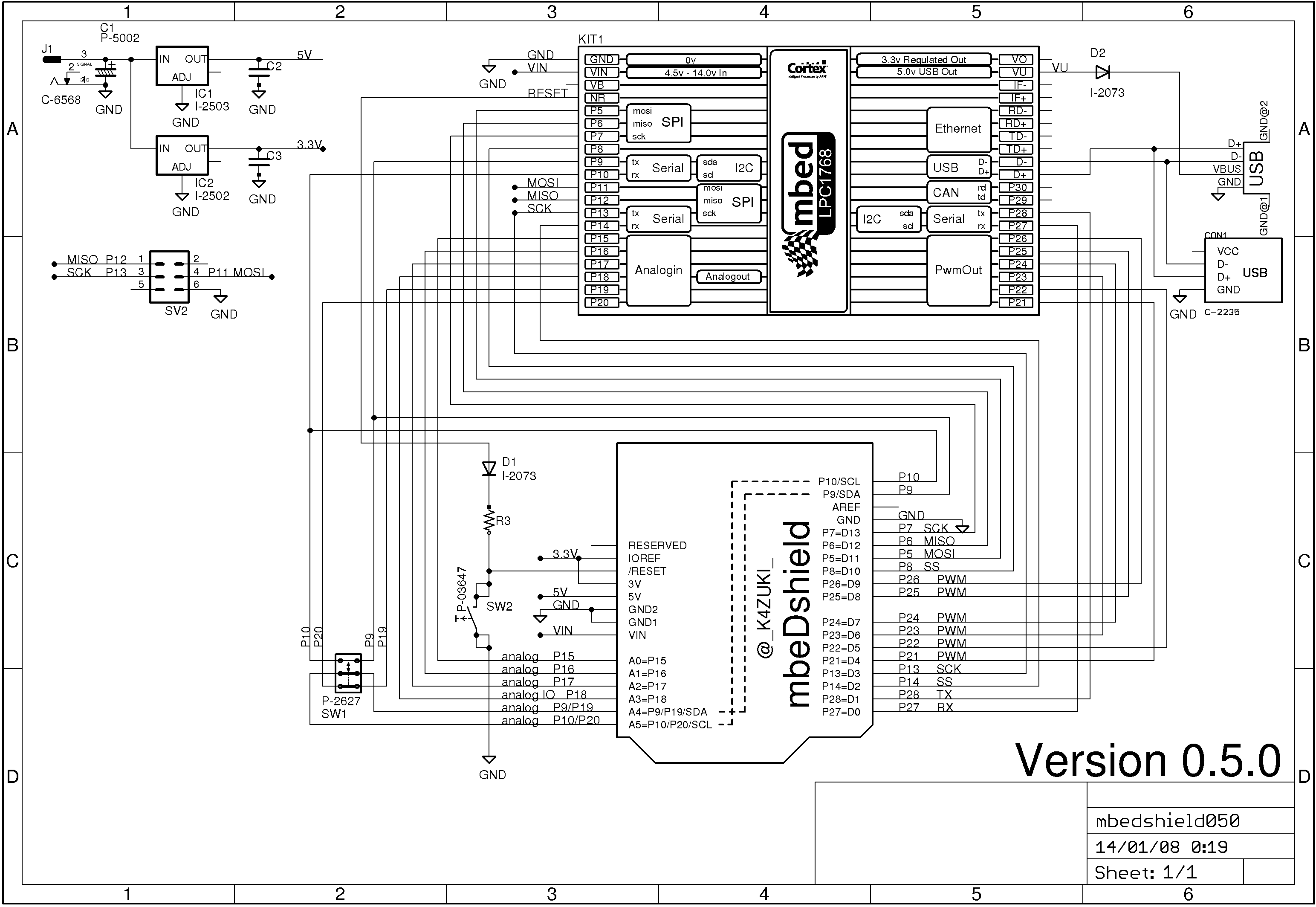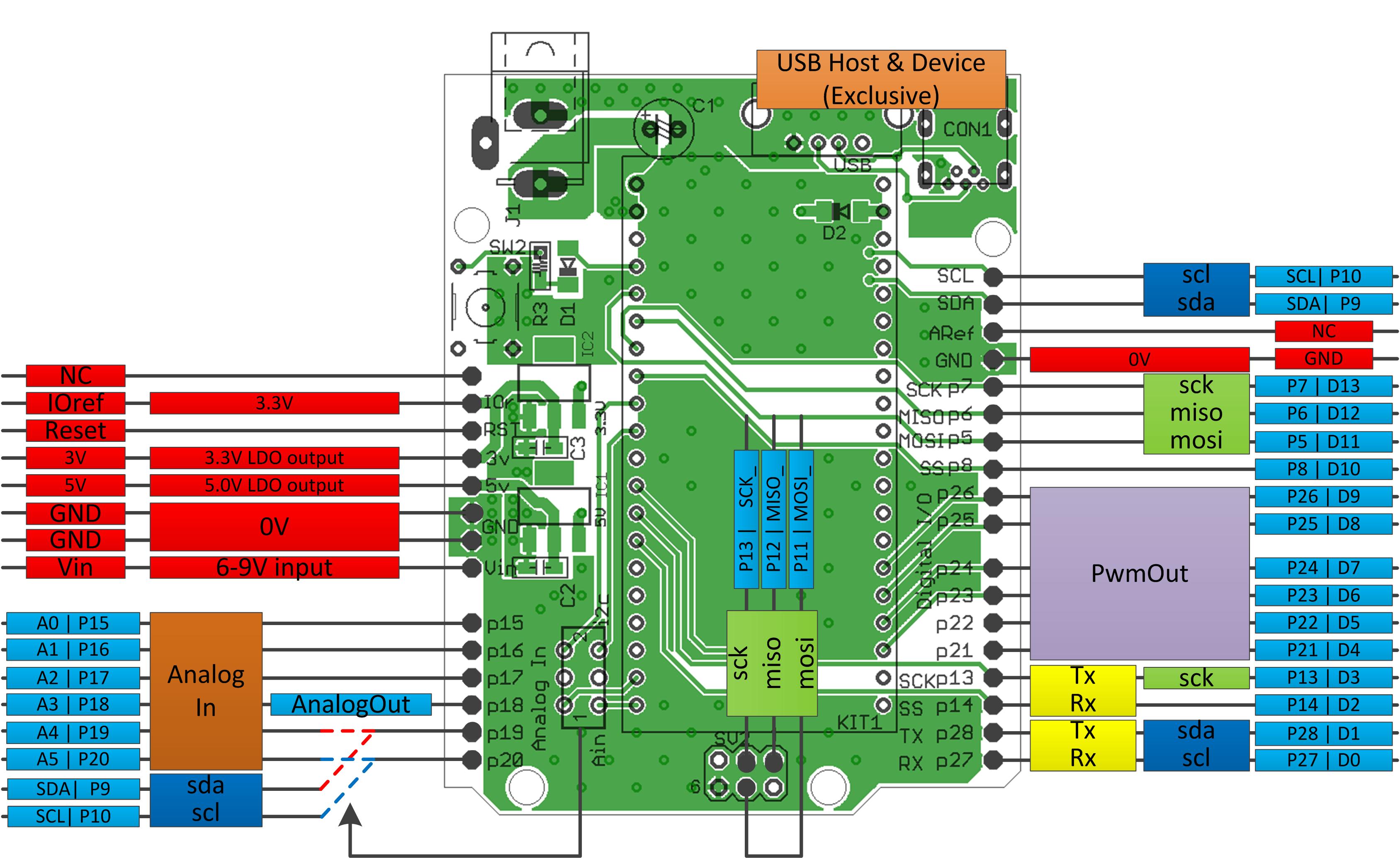The official mbed C/C SDK provides the software platform and libraries to build your applications.
Fork of mbed by
(01.May.2014) started sales! http://www.switch-science.com/catalog/1717/
(13.March.2014) updated to 0.5.0
This is a pin conversion PCB from mbed 1768/11U24 to arduino UNO.
- So if you have both mbed and arduino shields, I guess you would be happy with such a conversion board :)
Photos
- Board photo vvv

- Schematic photo vvv

- Functionality photo vvv

Latest eagle files
PCB >> /media/uploads/k4zuki/mbedshield050.brd
SCH >> /media/uploads/k4zuki/mbedshield050.sch
BIG changes from previous version
- Ethernet RJ45 connector is removed.
- http://mbed.org/components/Seeed-Ethernet-Shield-V20/ is the biggest hint to use Ethernet!
MostALL of components can be bought at Akizuki http://akizukidenshi.com/- But sorry, they do not send parts to abroad
- Pinout is changed!
| arduino | 0.4.0 | 0.5.0 |
|---|---|---|
| D4 | p12 | p21 |
| D5 | p11 | p22 |
| MOSI_ | none | p11 |
| MISO_ | none | p12 |
| SCK_ | none | p13 |
This design has bug(s)
- I2C functional pin differs between 1768 and 11U24.
Fixed bugs here
- MiniUSB cable cannot be connected on mbed if you solder high-height electrolytic capacitor on C3.
- http://akizukidenshi.com/catalog/g/gP-05002/ is the solution to make this 100% AKIZUKI parts!
- the 6-pin ISP port is not inprimented in version 0.4.0
it will be fixed in later version 0.4.1/0.4.2/0.5.0This has beenfixed
I am doing some porting to use existing arduino shields but it may faster if you do it by yourself...
you can use arduino PinName "A0-A5,D0-D13" plus backside SPI port for easier porting.
To do this you have to edit PinName enum in
- "mbed/TARGET_LPC1768/PinNames.h" or
- "mbed/TARGET_LPC11U24/PinNames.h" as per your target mbed.
here is the actual list: This list includes define switch to switch pin assignment
part_of_PinNames.h
USBTX = P0_2,
USBRX = P0_3,
//from here mbeDshield mod
D0=p27,
D1=p28,
D2=p14,
D3=p13,
#ifdef MBEDSHIELD_050
MOSI_=p11,
MISO_=p12,
SCK_=p13,
D4=p21,
D5=p22,
#else
D4=p12,
D5=p11,
#endif
D6=p23,
D7=p24,
D8=p25,
D9=p26,
D10=p8,
D11=p5,
D12=p6,
D13=p7,
A0=p15,
A1=p16,
A2=p17,
A3=p18,
A4=p19,
A5=p20,
SDA=p9,
SCL=p10,
//mbeDshield mod ends here
// Not connected
NC = (int)0xFFFFFFFF
LPC11U24/uARM/power_api.h
- Committer:
- emilmont
- Date:
- 2011-11-29
- Revision:
- 27:7110ebee3484
File content as of revision 27:7110ebee3484:
/****************************************************************************
* $Id:: power_api.h 6249 2011-01-25 19:23:47Z usb01267 $
* Project: NXP LPC11Uxx software example
*
* Description:
* Power API Header File for NXP LPC11Uxx Device Series
*
****************************************************************************
* Software that is described herein is for illustrative purposes only
* which provides customers with programming information regarding the
* products. This software is supplied "AS IS" without any warranties.
* NXP Semiconductors assumes no responsibility or liability for the
* use of the software, conveys no license or title under any patent,
* copyright, or mask work right to the product. NXP Semiconductors
* reserves the right to make changes in the software without
* notification. NXP Semiconductors also make no representation or
* warranty that such application will be suitable for the specified
* use without further testing or modification.
****************************************************************************/
#ifndef __LPC11UXX_POWER_API_H__
#define __LPC11UXX_POWER_API_H__
#ifdef __cplusplus
extern "C" {
#endif
#define PWRROMD_PRESENT
typedef struct _PWRD {
void (*set_pll)(unsigned int cmd[], unsigned int resp[]);
void (*set_power)(unsigned int cmd[], unsigned int resp[]);
} PWRD;
typedef struct _ROM {
#ifdef USBROMD_PRESENT
const USB * pUSBD;
#else
const unsigned p_usbd;
#endif /* USBROMD_PRESENT */
const unsigned p_clib;
const unsigned p_cand;
#ifdef PWRROMD_PRESENT
const PWRD * pPWRD;
#else
const unsigned p_pwrd;
#endif /* PWRROMD_PRESENT */
const unsigned p_dev1;
const unsigned p_dev2;
const unsigned p_dev3;
const unsigned p_dev4;
} ROM;
//PLL setup related definitions
#define CPU_FREQ_EQU 0 //main PLL freq must be equal to the specified
#define CPU_FREQ_LTE 1 //main PLL freq must be less than or equal the specified
#define CPU_FREQ_GTE 2 //main PLL freq must be greater than or equal the specified
#define CPU_FREQ_APPROX 3 //main PLL freq must be as close as possible the specified
#define PLL_CMD_SUCCESS 0 //PLL setup successfully found
#define PLL_INVALID_FREQ 1 //specified freq out of range (either input or output)
#define PLL_INVALID_MODE 2 //invalid mode (see above for valid) specified
#define PLL_FREQ_NOT_FOUND 3 //specified freq not found under specified conditions
#define PLL_NOT_LOCKED 4 //PLL not locked => no changes to the PLL setup
//power setup elated definitions
#define PARAM_DEFAULT 0 //default power settings (voltage regulator, flash interface)
#define PARAM_CPU_PERFORMANCE 1 //setup for maximum CPU performance (higher current, more computation)
#define PARAM_EFFICIENCY 2 //balanced setting (power vs CPU performance)
#define PARAM_LOW_CURRENT 3 //lowest active current, lowest CPU performance
#define PARAM_CMD_SUCCESS 0 //power setting successfully found
#define PARAM_INVALID_FREQ 1 //specified freq out of range (=0 or > 50 MHz)
#define PARAM_INVALID_MODE 2 //specified mode not valid (see above for valid)
#define MAX_CLOCK_KHZ_PARAM 50000
#ifdef __cplusplus
}
#endif
#endif /* __LPC11UXX_POWER_API_H__ */
